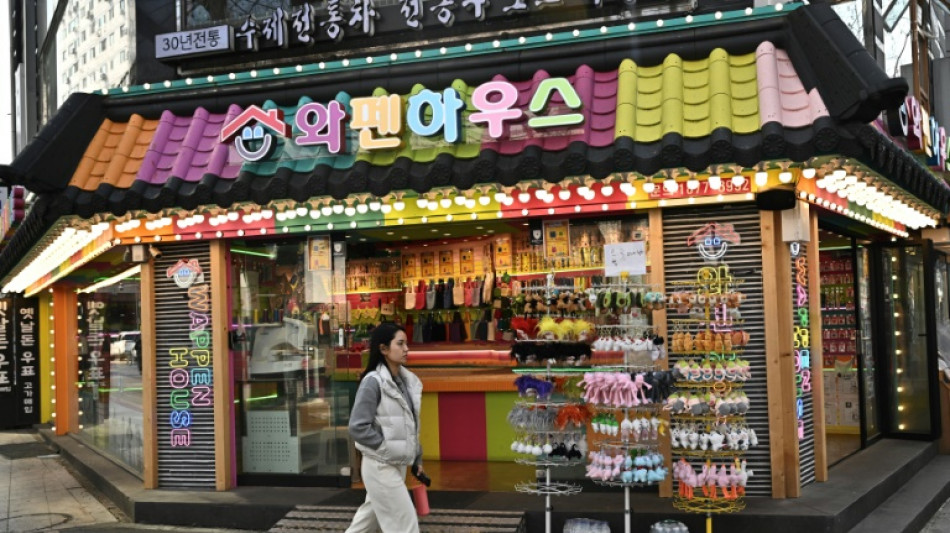
-
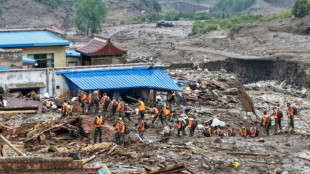 Death toll from northwest China floods rises to 13
Death toll from northwest China floods rises to 13
-
Greeks count cost of wildfire 'tragedy' near Athens

-
 Historic Spanish mosque-cathedral reopens after blaze
Historic Spanish mosque-cathedral reopens after blaze
-
Massive French wildfire contained but 'not under control'
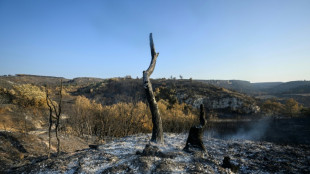
-
 Sesko completes Manchester United's new-look forward line-up
Sesko completes Manchester United's new-look forward line-up
-
Manchester United sign forward Benjamin Sesko: club

-
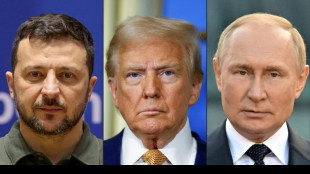 Kyiv won't give up land, says Zelensky as US-Russia summit confirmed
Kyiv won't give up land, says Zelensky as US-Russia summit confirmed
-
Kyiv won't give up land, says Zelensky as US-Russia confirm summit
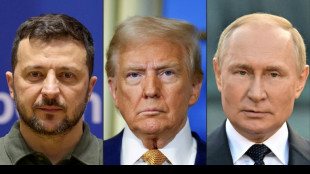
-
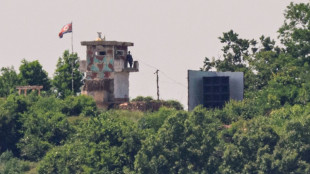 North Korea removing border loudspeakers: Seoul military
North Korea removing border loudspeakers: Seoul military
-
Gunman kills police officer near Atlanta CDC headquarters

-
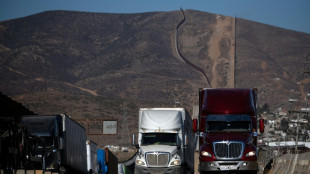 Mexico discounts risk of 'invasion' after Trump order to target cartels
Mexico discounts risk of 'invasion' after Trump order to target cartels
-
Nawaz sparks Pakistan to five-wicket ODI win over West Indies

-
 Lions' Norris hospitalized after scary injury, NFL pre-season game suspended
Lions' Norris hospitalized after scary injury, NFL pre-season game suspended
-
Restored Nagasaki bell rings in 80 years since A-bomb
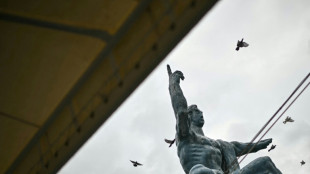
-
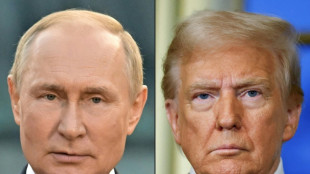 Putin-Trump summit: what we know so far
Putin-Trump summit: what we know so far
-
Australia settle on Marsh and Head as T20 openers

-
 New York declares total war on prolific rat population
New York declares total war on prolific rat population
-
Patriots unveil statue honoring iconic quarterback Tom Brady

-
 Slot's new-look Liverpool under the spotlight in Community Shield
Slot's new-look Liverpool under the spotlight in Community Shield
-
Five astronauts leave space station for trip back to Earth
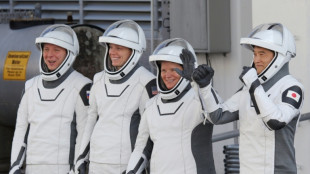
-
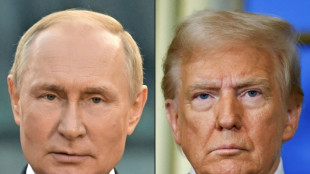 Trump and Putin to meet in Alaska next Friday
Trump and Putin to meet in Alaska next Friday
-
NBA to open season with blockbuster showdowns: report

-
 Brazil's Lula vetoes parts of environmental 'devastation bill'
Brazil's Lula vetoes parts of environmental 'devastation bill'
-
Trump says Armenia, Azerbaijan commit to end fighting 'forever'
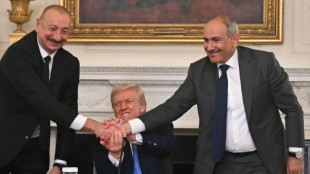
-
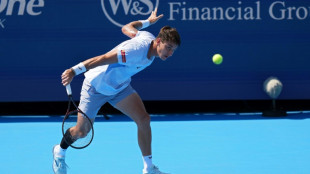 Toronto champion Shelton to start Cincy against Argentine outsider
Toronto champion Shelton to start Cincy against Argentine outsider
-
US astronaut Jim Lovell, commander of Apollo 13, dead at 97

-
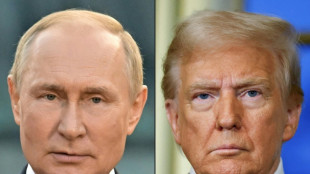 Trump says to meet Putin next Friday in Alaska
Trump says to meet Putin next Friday in Alaska
-
Fire extinguished, historic mosque-cathedral in southern Spain 'saved'

-
 Trump demands $1bn from University of California over UCLA protests
Trump demands $1bn from University of California over UCLA protests
-
Fire contained, historic mosque-cathedral in southern Spain 'saved'

-
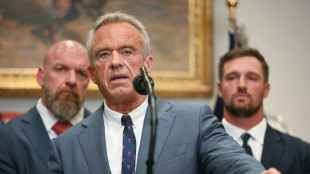 US health chief based vaccine cuts on misinformation, researchers say
US health chief based vaccine cuts on misinformation, researchers say
-
US astronaut Jim Lovell, commander of imperiled Apollo 13, dead at 97

-
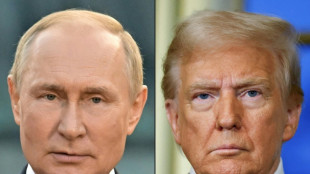 Trump says will meet with Putin 'very shortly'
Trump says will meet with Putin 'very shortly'
-
Barcelona reinstate Ter Stegen as captain

-
 Fleetwood leads St. Jude in search of first US PGA Tour title
Fleetwood leads St. Jude in search of first US PGA Tour title
-
Gold futures hit record on US tariff shock; mixed day for stocks

-
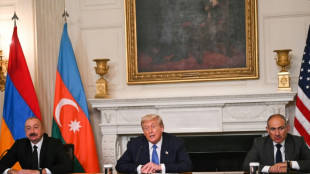 Trump says Armenia, Azerbaijan committed to end fighting 'forever'
Trump says Armenia, Azerbaijan committed to end fighting 'forever'
-
England's injured Woakes still has Ashes hopes

-
 US astronaut Jim Lovell, Apollo 13 commander, dead at 97
US astronaut Jim Lovell, Apollo 13 commander, dead at 97
-
Swiss gold refining sector stung by US tariffs

-
 New Instagram location sharing feature sparks privacy fears
New Instagram location sharing feature sparks privacy fears
-
Spain's Badosa withdraws from US Open

-
 Mexico seeks compensation from Adidas in cultural appropriation row
Mexico seeks compensation from Adidas in cultural appropriation row
-
NBA Celtics sign Mazzulla to coaching contract extension

-
 Swiss gold refining sector hits US tariff mine
Swiss gold refining sector hits US tariff mine
-
Ter Stegen responds after Barcelona strips him of captaincy

-
 Chelsea's Broja joins Burnley on five-year deal
Chelsea's Broja joins Burnley on five-year deal
-
Three centurions as 'ruthless' New Zealand pile on runs against Zimbabwe

-
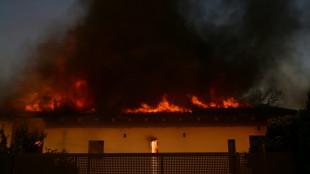 Three die in Greece as gales stoke fires, disrupt ferries
Three die in Greece as gales stoke fires, disrupt ferries
-
ICC unseals Libya war crimes warrant for militia officer
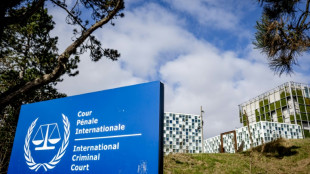
| SCU | 0% | 12.72 | $ | |
| CMSD | 0.25% | 23.58 | $ | |
| BCC | -1.34% | 82.09 | $ | |
| NGG | -1.51% | 71.01 | $ | |
| RIO | 1.76% | 61.86 | $ | |
| AZN | -0.69% | 73.55 | $ | |
| CMSC | 0.39% | 23.05 | $ | |
| GSK | 0.58% | 37.8 | $ | |
| JRI | 0.19% | 13.435 | $ | |
| BCE | 2.34% | 24.35 | $ | |
| BTI | 0.96% | 57.24 | $ | |
| RELX | -2.2% | 48 | $ | |
| RYCEF | -0.14% | 14.42 | $ | |
| VOD | 0.88% | 11.36 | $ | |
| BP | -0.15% | 34.14 | $ | |
| SCS | -0.76% | 15.88 | $ | |
| RBGPF | 1.7% | 73.08 | $ |

S. Korea's economy shrinks in first quarter as trade war hits exports
South Korea's economy unexpectedly contracted 0.1 percent in the first three months of this year, the country's central bank said Thursday, as the Asian export giant reels from months of political chaos and heightened trade tensions.
US President Donald Trump's threatened 25 percent "reciprocal" tariffs on export-dependent South Korea have rattled Asia's fourth-largest economy, sending Seoul-listed shares tumbling and pushing the currency to its weakest level since 2009.
The country is also still emerging from a political crisis triggered by former president Yoon Suk Yeol's December attempt to suspend civilian rule, which culminated in his impeachment and removal from office this month.
"Real gross domestic product (GDP) fell by 0.1 percent compared to the same period last year," the central bank said, adding that it contracted by 0.2 percent from the previous quarter.
"Two developments hit confidence and the economy -- fallout from former President Yoon Suk Yeol's failed martial law attempt and worries about shifts in US trade policies," said Hyosung Kwon, an economist at Bloomberg Economics.
"Looking ahead, we see the economy rebounding in the second quarter of this year, helped by easing political uncertainty at home. But the recovery will likely remain fragile as elevated US tariffs weigh on external demand," Kwon added.
- Dented exports -
The country's economy expanded 1.3 precent in the first quarter of last year but grew less than expected in the fourth quarter, as the fallout from Yoon's declaration of martial law hit consumer confidence and domestic demand.
According to the Korea Customs Service, as of mid-April, the country's exports had dropped by more than 5 percent compared to the previous year, with declines reported in nine out of the country's ten major export categories excluding semiconductors.
The sharpest fall was in exports to the United States, which plunged by more than 14 percent.
The International Monetary Fund this week sharply revised down its growth forecast for South Korea for the year, cutting it from 2.0 percent to 1.0 percent.
"The South Korean economy is facing structural burdens of high inflation and a weak won-dollar exchange rate, and under this dual pressure, a slowdown in growth is becoming increasingly evident," Kim Dae-jong, a professor at Sejong University, told AFP.
Bank of Korea governor Rhee Chang-yong said last week the country's annual growth rate is now "expected to fall short of the 1.5 percent forecast made in February".
"The tightening of tariff policies, which is much stronger than initially projected, will likely further weigh on growth prospects," he told reporters in a press conference.
He added that "political uncertainty has dragged on longer than expected, delaying the recovery of economic sentiment."
Sluggish domestic demand, along with factors such as large-scale wildfires which tore through swaths of the country's southeast in late March, had also contributed to the downturn, Rhee said.
Addressing parliament, acting president Han Duck-soo underlined "significant" challenges by South Korea.
"Unprecedented US-driven tariff policies have created a level of uncertainty that is causing rapid and unpredictable shifts in the global economic landscape," Han told the National Assembly.
US tariffs on steel and automobiles, as well as broader levies imposed by Trump on other goods, are expected to "place considerable strain on Korean industries and businesses," added Han.
F.AbuShamala--SF-PST
